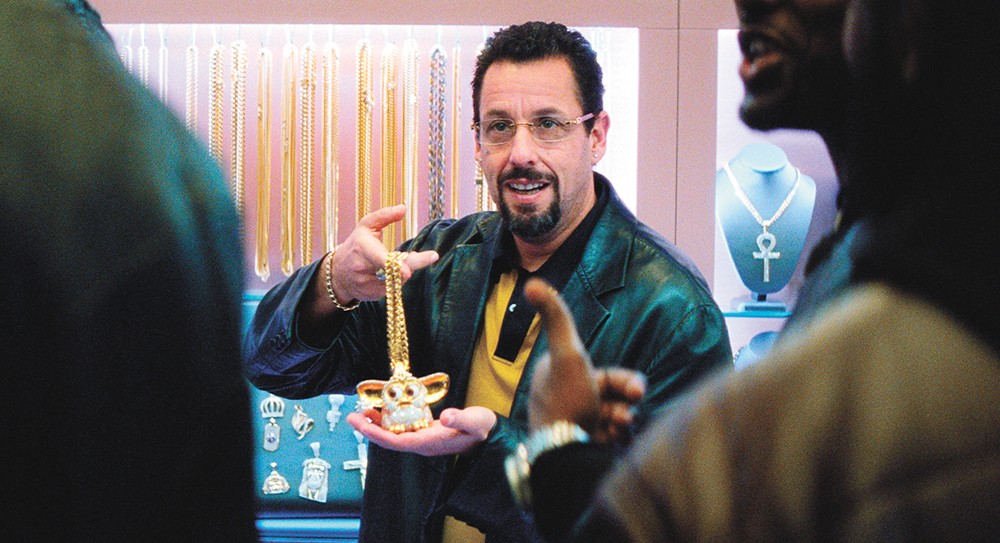Image description: Adam Sandler plays Howard Ratner; a middle-aged man with square glasses and a goatee-beard. He is in a jewellery shop, standing in front of a case of gold chain necklaces. He faces a customer to the left of the camera, and holds up a gold and diamond-encrusted Furbie necklace for display.
By Jack Logan
Uncut Gems is a story propelled by faith that starts and ends in violence. In between it all is family, love, and sheer belief, but it wants you to know that the exchange of money is an act fundamentally soaked in blood.
Directed by the Safdie Brothers as their follow-up to their 2017 feature Good Time, the film follows Adam Sandler’s Howard Ratner, a jeweller and gambling addict operating out of New York City’s diamond district, whose life begins to unravel once he gets his hands on a precious gemstone from the far-flung opal mines of Ethiopia. Uncut Gems is the story of Howard being dragged across the pavement of the Big Apple, bloodied and bruised, as he desperately tries to close one deal after another.
Giving the film an incredible burst of energy through his frenzied and desperate portrayal of the embattled protagonist, Uncut Gems adds another jewel to the bizarre trajectory that is Sandler’s career. While his usual comedic performances rarely earn him anything but ridicule, he has shown time and again that he can deliver compelling dramatic performances, and this is no exception. Sandler’s character possesses the kind of ambition and passion anyone can appreciate, but lacks any of the usual hallmarks of a movie hero. He is beaten up, laughed at, and bursts into tears. His wife and daughter have no respect for him, and he is derided by his peers for his gambling habits.
And yet, I couldn’t help but admire Howard for trying to make it big, because he never takes his eyes off the ball – no matter how many times it slips through his fingers.
He is relatable because, ambitions aside, he couldn’t be more ordinary. He is not a hero entangled in destiny or prophecy, nor is he burdened by oppression. While Howard’s Jewishness is central to his identity, anti-Semitism is not a barrier he has to overcome in this film. He is a man of extraordinary drive and determination, and yet most of his problems are of his own making. Howard’s characterisation is a direct inversion Connie’s – the protagonist of Good Time. While Connie’s apparent love for his brother hid a selfish desire for ‘the big dosh’, Howard’s selfish exterior hides a deep care for those around him, appealing for their safety even when all have seemingly abandoned him.
The film unfolds in the diamond district of a New York City that is not quite our present, with a handful of celebrity appearances to immerse the viewer in this setting. The year is 2012; the Weeknd is emerging as a new pop artist; and Kevin Garnett is trying to lead the Boston Celtics to victory in the NBA playoffs. With both appearing as themselves, the former – in our time, at the peak of his career – provides a convincing portrayal of a brash and overconfident artist starting out. But it’s Garnett who truly shines as the highly successful and superstitious Celtics star. It is his introduction to Howard that fuels the conflict of the film, with the two becoming intertwined in each other’s fates as part of an enduring theme of faith that permeates the narrative of the film.
Upon seeing the titular precious opal, Garnett is obsessed, and begins to believe the stone has magical properties that will improve his performance on the court. Is he correct, or is the opal, as another character puts it, “just a fucking rock”? It doesn’t matter, because it’s this faith that propels him throughout the film. Likewise, Howard has faith that the opal, through Garnett and a series of high-stakes bets, will bring him untold wealth and fortune, and allow him to finally expel those that have been hounding him.
The diamond district itself is a product of faith, populated almost entirely by the descendants of Orthodox Jews who believed in a refuge across the Atlantic after being hounded from their homes by European fascists. In their attempt to create an authentic landscape of this one-block universe tucked away in New York, the Safdies spent the better part of the decade learning the ins and outs of the jewellery trade, and this respect for the area and its Jewish population really shines through in the film. As well as a gambler and a businessman, Howard is an observant Jew, committed to his tradition and his family. This is a man who, for all his shortcomings, can quote from the Torah as readily as he can quote the day’s diamond prices.
The glitz and glimmer of this wealthy district is suitably matched by the acoustic glow of musician Oneohtrix Point Never’s synth-heavy score, giving the whole film a glossy sheen that elevates Uncut Gems from a simple urban thriller, to a deeply compelling tale of greed and obsession. The lights of the basketball court and the neon of New York are reflected in the score’s soft electronic beats, which crescendo just as quickly as the shit hits the fan in Howard’s obstacle-laden journey.
Uncut Gems is a brilliant story of faith and violence that mediates on moments of hope and belief as often as it throws its embattled and bloody protagonist against the wall. With an earnest setting, mesmerising score, and a convincing set of characters led by a revelatory performance from Sandler, this is a film cut to perfection.
Four and a half Ethiopian Opals out of Five
Jack Logan is a third-year student who is too broke to buy movies, and too up himself to pirate them.
Image courtesy of Netflix and Inlander.com.

